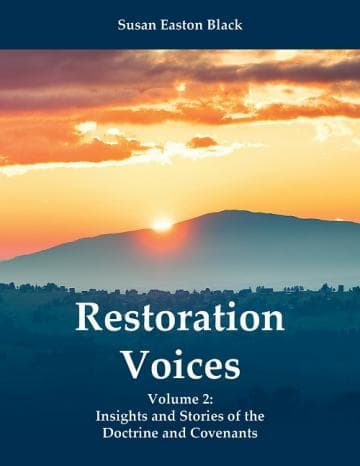Book
140 Chapters

On April 26, 1832, two days after Joseph Smith and other brethren arrived in Jackson County, Missouri, Bishop Edward Partridge and Elder Sidney Rigdon were at odds with each other. The issue was one of judgment. Without these brethren reaching a consensus, a General Council of the Church went ahead as planned. During the morning session of the council, Joseph was acknowledged as President of the High Priesthood, a position granted him on January 25, 1832, at Amherst, Ohio.
Between the morning and afternoon sessions, Joseph said, “[The] difficulty or hardness which had existed between Bishop Partridge and Elder Rigdon was amicably settled, all hearts seemed to rejoice, and I received the following revelation.”[1] In the revelation, the Lord told the Prophet Joseph and those assembled at the council to “beware from henceforth, and refrain from sin, lest sore judgments fall upon your heads” (D&C 82:2). The Lord explained, “For of him unto whom much is given much is required” (v. 3).
Elder LeGrand Richards of the Quorum of the Twelve Apostles taught,
Each will be required to give an accounting only for the talents or gifts he has received (Matthew 25:14–40). No man can say that he has received nothing. Even though it be but one talent, he will be expected to develop that talent so that when his Lord comes, he will be able to return it with profit. ... Can you imagine any greater justification for ‘weeping and gnashing of teeth,’ than to learn from your Lord, when called to give an accounting for your life here upon the earth, that while you had been faithful in your spirit existence and had kept your first estate, you had failed in your second estate?[2]
The blessing of being given much is the promise that, if we are faithful, the Lord is “bound when ye do what I say; but when ye do not what I say, ye have no promise” (D&C 82:10).
There is a tendency to sit in judgment of others rather than wait for them to give an accounting of their talents or gifts. At the general conference in October 2010, President Thomas S. Monson shared an example of being too quick to judge others:
Forty-seven years ago this general conference, I was called to the Quorum of the Twelve Apostles. At the time, I had been serving on one of the general priesthood committees of the Church, and so before my name was presented, I sat with my fellow members of that priesthood committee, as was expected of me. My wife, however, had no idea where to go and no one with whom she could sit and, in fact, was unable to find a seat anywhere in the Tabernacle.
A dear friend of ours, who was a member of one of the general auxiliary boards and who was sitting in the area designated for the board members, asked Sister Monson to sit with her. This woman knew nothing of my call—which would be announced shortly—but she spotted Sister Monson, recognized her consternation, and graciously offered her a seat. My dear wife was relieved and grateful for this kind gesture.
Sitting down, however, she heard loud whispering behind her as one of the board members expressed her annoyance to those around her that one of her fellow board members would have the audacity to invite an “outsider” to sit in this area reserved only for them. There was no excuse for her unkind behavior, regardless of who might have been invited to sit there. However, I can only imagine how that woman felt when she learned that the “intruder” was the wife of the newest Apostle.[3]
Book
140 Chapters
Items in the BMC Archive are made publicly available for non-commercial, private use. Inclusion within the BMC Archive does not imply endorsement. Items do not represent the official views of The Church of Jesus Christ of Latter-day Saints or of Book of Mormon Central.